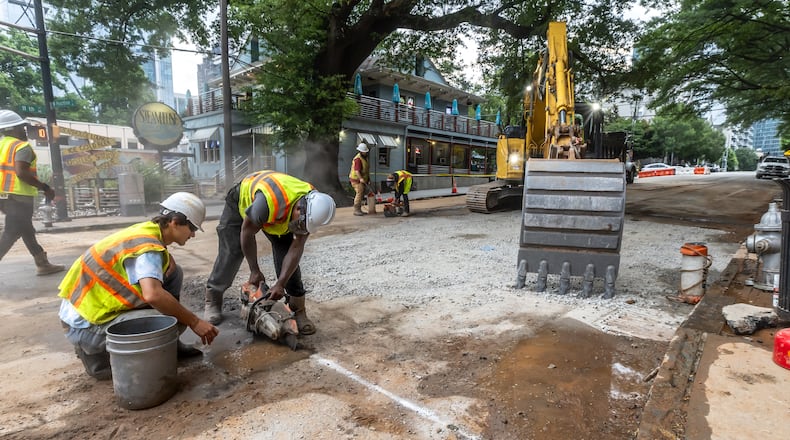As Atlanta faces the daunting and expensive task of updating its aging water system, a new influx of cash is coming to help — and it’s from a surprising source.
In mid-June, days after a crippling series of water main breaks became national news, the City Council approved an amendment to an ordinance which freed up $177 million from what is essentially a savings account for the Department of Watershed Management. The accounting maneuver to tap the bond reserve fund comes with some potential risk, but it will boost the department’s budget by nearly a quarter.
The move comes amid new urgency to find money to improve Atlanta’s water system. The water main breaks that affected more than half the city in late May and early June put a harsh spotlight on city leaders who have often invested more in Atlanta’s troubled sewers than its creaky drinking water system.
The reserves are there as a backstop for bondholders and the ratepayers, but the city’s top financial officer said he’s confident watershed management has sufficient revenue and reserve funds it can access. Atlanta Mayor Andre Dickens, meanwhile, has said he will seek federal funds to help with what could be a multibillion-dollar plumbing problem.
Credit: John Spink
Credit: John Spink
In the near term, watershed management will soon have millions more it can pour into its capital improvement projects.
“We understand that the utility’s fighting many different fights in terms of its infrastructure needs and its capital needs,” Mohamed Balla, the city’s chief financial officer, told The Atlanta Journal-Constitution.
“It has more work than it can handle … We want to do all our efforts before we have to go back and raise rates,” said Balla, who was previously the deputy commissioner and CFO of the city’s watershed management department.
‘Best interest’
In the late 1990s, Atlanta entered into two consent decrees with the federal government that mandated improvements to the city’s sewers because they routinely overflowed and polluted the Chattahoochee and South rivers.
The improvements were costly, but the consent decrees didn’t come with any funding to pay for the updates. The city didn’t have the cash on hand, so it borrowed about $3 billion by selling bonds, Balla said.
Watershed management pays back the loans through water bills and the one-cent Municipal Option Sales Tax. The city’s initial bond rules required a year’s worth of average debt payments for the department’s priority bonds be set aside in case it couldn’t pay back its loans from the rates and taxes collected in a given year.
Balla said that when the bonds started to go to market in the early 2000s, Atlanta didn’t have as high of a credit rating as it does now, so the reserve fund was a necessary signal to encourage investors.
On average, watershed management’s annual debt service is $106 million, according to Balla. That’s the minimum the department had to keep in the reserve fund, but up until this month, it had much more in reserve — $230 million.
But after the City Council passed an amendment to the bond ordinance on June 17 allowing just half of the average annual debt payments to be set aside, now it only needs to keep $53 million in reserves.
All of a sudden, there’s an extra $177 million that can cover watershed management’s other needs.
The legislation was initially submitted to the City Council’s finance committee on May 29, two days before the first water main break near downtown plunged Atlanta into a days-long crisis.
Though the timing of the amendment was “completely coincidental,” Balla said, the extra funds will go towards capital improvement projects that will likely include upgrades to the drinking water system, though he did not detail specific projects.
But Matt Fabian, partner at the research group Municipal Market Analytics, said it’s rare for an entity to keep less than a year’s worth of payments in reserve.
“It does give the city less flexibility in the future,” Fabian said. It’s not necessarily a bad decision, because the city doesn’t have to borrow money to fund projects covered by cash, but “the reserve fund is there not just to protect investors, but also the city.”
“If the city finds itself short inadvertently, then it could wind up needing that reserve money to make sure that it doesn’t have a payment default,” he said.
Credit: Hyosub Shin/AJC
Credit: Hyosub Shin/AJC
Balla said he is not worried about the decrease in reserves because watershed management has $1.3 billion in cash on hand, which could be tapped in an emergency, he said. Peer cities also have a similar reserve requirement, he added.
Before submitting the legislation to the council, city officials also asked credit rating agencies if this move would downgrade Atlanta’s rating. Balla said the city was told it would not.
“We thought that having this mechanism and releasing this cash is in the best interest of the ratepayers,” Balla said. Otherwise, watershed management may have had to raise rates, which the department has not done since 2012.
From 2002 to 2012, water and sewer rates increased by 252% to be able to pay for the consent decree sewer improvements, according to court documents.
But if Atlanta defaults on a payment, it could damage the city’s credit rating, which in turn could make it more expensive to borrow money in the future, and rates could be increased to cover higher debt payments.
Balla said he doesn’t think a credit downgrade just because of the reserve fund change is likely unless there was also “significant revenue decrease, astronomical cash depletion, things that went haywire from an infrastructure perspective.”
But as Atlanta comes out from a recent water crisis and looks at upgrading more of its system, it needs to find the funding to make it happen.
The Atlanta Journal-Constitution and Report for America are partnering to add more journalists to cover topics important to our community. Please help us fund this important work here.
About the Author
Keep Reading
The Latest
Featured



